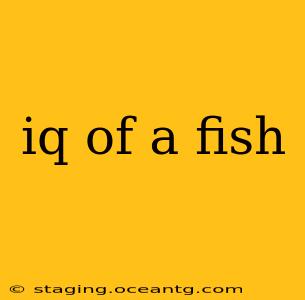Fish, often underestimated creatures of the underwater world, possess a surprising level of intelligence that is only now beginning to be fully understood. For years, the common perception was that fish were simple, instinct-driven animals. However, a growing body of scientific research reveals a far more complex reality, showcasing sophisticated cognitive abilities and problem-solving skills. While assigning a single "IQ" score to fish is impossible and misleading (human IQ tests are designed for humans!), we can explore their cognitive capabilities and compare them across species.
What is the average IQ of a fish?
This question is fundamentally flawed. The concept of IQ, as measured by standardized human intelligence tests, simply doesn't apply to fish. These tests measure specific cognitive abilities relevant to human experience and social structures. Fish, with their vastly different sensory systems, social structures, and environments, utilize intelligence in ways fundamentally different from humans. Instead of focusing on an "average IQ," we should examine the specific cognitive abilities of various fish species.
Do fish have different levels of intelligence?
Absolutely! Just as there's a wide range of intelligence among mammals and birds, fish species exhibit drastically different cognitive abilities. Some species, such as certain reef fish, demonstrate impressive spatial memory, navigational skills, and social complexity. Others might rely more heavily on innate behaviors. Factors like brain size relative to body size, social complexity, and environmental demands all contribute to the diversity of cognitive abilities observed in the fish world.
How intelligent are fish compared to other animals?
Comparing the intelligence of fish to other animals isn't a simple matter of ranking them on a single scale. Different animals excel in different areas. While primates and certain birds often showcase advanced problem-solving and tool use, some fish exhibit exceptional social learning, spatial awareness, and memory capabilities that are equally impressive. For example, certain species of fish display complex communication and cooperative hunting strategies that rival the sophistication of many other animal groups. The crucial point is that intelligence manifests in diverse ways, tailored to each species' ecological niche and evolutionary history.
Can fish solve problems?
Yes, many fish species demonstrate impressive problem-solving skills. Experiments have shown that fish can learn to navigate mazes, open containers to obtain food, and even recognize individual humans. Their ability to adapt their behavior in response to new challenges demonstrates a significant level of cognitive flexibility. For instance, some fish have been observed using tools, such as manipulating objects to gain access to food sources or shelter.
What are the most intelligent fish species?
Pinpointing the "most intelligent" is subjective, but some species consistently stand out for their cognitive abilities. Cichlids are frequently cited for their complex social structures, sophisticated communication, and remarkable problem-solving abilities. Other contenders include some species of wrasses, parrotfish, and even certain sharks, all demonstrating impressive learning capacities and behavioral flexibility. However, research into fish intelligence is an ongoing field, and our understanding of their cognitive capabilities is constantly evolving.
Do fish feel pain?
Yes, scientific evidence strongly suggests that many fish species experience pain and possess the physiological mechanisms to detect and respond to noxious stimuli. While the subjective experience of pain might differ from that of humans, fish exhibit clear behavioral changes, like avoiding harmful stimuli and displaying signs of distress, when subjected to painful situations. This understanding is crucial for ethical considerations in fishing practices and aquaculture.
In conclusion, while we cannot assign an IQ score to fish, their cognitive capabilities are far more complex and nuanced than previously thought. Ongoing research continues to unveil the surprising intelligence and sophistication of these aquatic creatures, challenging our understanding of animal cognition and highlighting the importance of responsible interactions with our underwater neighbors.
